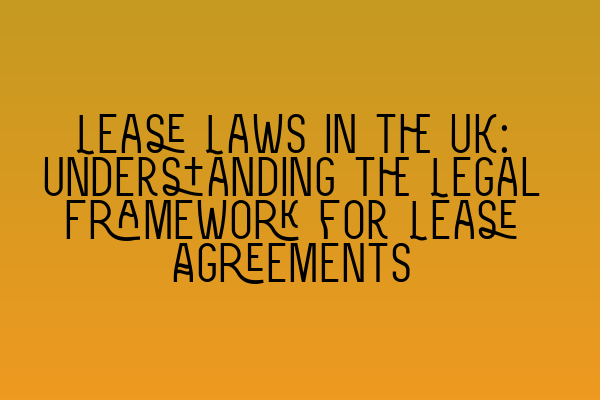Lease Laws in the UK: Understanding the Legal Framework for Lease Agreements
Welcome to the SQE Property Law & Land Law blog, where we strive to provide you with valuable information and insights into various legal aspects of property and land transactions. In today’s post, we will focus on lease laws in the UK and help you understand the legal framework surrounding lease agreements. Whether you are a property owner, tenant, or a legal professional, having a clear understanding of lease laws is essential for protecting your rights and interests.
Before we delve into the intricacies of lease laws, let’s start with a basic definition. A lease agreement, often referred to as a tenancy agreement, is a legally binding document that establishes the rights and responsibilities of both landlords and tenants in relation to a property. These agreements are crucial in rental or lease transactions and play a pivotal role in governing the relationship between landlords and tenants.
The UK has specific laws and regulations in place to protect the rights of both landlords and tenants. These laws cover various aspects such as lease terms, rent payments, repairs and maintenance, eviction procedures, and more. Understanding these legal requirements is essential for ensuring a fair and lawful lease agreement.
Key Legal Considerations for Lease Agreements
When entering into a lease agreement, it’s important to consider several key legal aspects. Let’s explore some of these considerations:
1. Lease Terms and Conditions
The lease agreement should clearly define the terms and conditions of the lease, including the duration of the lease, rent amount, payment schedule, and any other relevant obligations and restrictions. It’s crucial to ensure that the terms are fair and reasonable for both parties.
2. Repair and Maintenance Responsibilities
The lease agreement should outline the responsibilities of both the landlord and the tenant regarding repairs and maintenance. It’s essential to clearly define who is responsible for different aspects of property upkeep, such as structural repairs, plumbing, electrical maintenance, etc.
3. Deposit Protection
Landlords in the UK are required by law to protect their tenants’ deposits in a government-approved deposit protection scheme. This provides assurance to tenants that their deposits are safeguarded and can be easily reclaimed at the end of the tenancy.
4. Notice Periods for Termination
Both landlords and tenants need to be aware of the notice periods required for terminating a lease agreement. Understanding these notice periods is crucial for avoiding legal disputes and ensuring a smooth transition at the end of the tenancy.
5. Subletting and Assignment
The lease agreement should outline whether subletting or assignment of the property is allowed. These provisions are important to prevent unauthorized subletting or transfer of the lease without proper consent from the landlord.
6. Dispute Resolution
In the event of a disagreement or dispute between the landlord and tenant, having a clear provision for dispute resolution is crucial. This can help avoid costly and time-consuming legal proceedings by providing a framework for resolving disputes through negotiation, mediation, or arbitration.
Seeking Legal Advice
Given the complexity of lease laws, it is advisable for both landlords and tenants to seek legal advice when drafting or entering into lease agreements. A solicitor specializing in property law can provide valuable guidance and ensure that your lease agreement complies with all legal requirements.
If you’re a legal professional preparing for the SQE 1 or SQE 2 exams, SQE Property Law & Land Law offers a range of preparation courses to help you excel. Check out our SQE 1 Preparation Courses and SQE 2 Preparation Courses to improve your knowledge and performance.
Conclusion
Lease laws in the UK provide a robust legal framework for lease agreements, protecting the rights and interests of both landlords and tenants. Understanding the legal considerations involved in lease agreements is essential for ensuring a smooth and lawful tenancy. If you require legal assistance or further information on lease laws, please don’t hesitate to contact SQE Property Law & Land Law.
For more practice exam questions, consider taking a look at our article on SQE 1 Practice Exam Questions and SQE 1 Practice Mocks FLK1 FLK2. Stay updated with the latest SRA SQE exam dates by visiting our article on SRA SQE Exam Dates.
